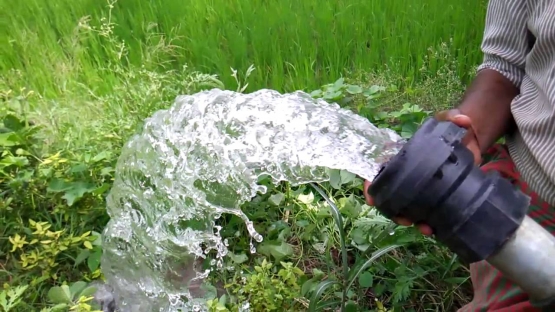A new IAEA coordinated research project (CRP) aims to address challenges related to the management of water resources for agricultural irrigation. Representing around 70% of overall global water withdrawals, irrigation—and the extraction and conservation practices around it—has an outsized impact on the overall situation of water safety and availability, at the global and local levels.
High water demand in irrigation areas often leads to intensive pumping and overexploitation of specific water sources. The quality of water can deteriorate, and conflicts can erupt over disputed sources. These effects become intensified when water is extracted from aquifers at rates that outstrip their rates of replenishment.
In order to improve assessment, mapping, and management of groundwater resources for irrigation, new techniques and methods are needed. Since different water sources, and different types of sources, contain unique isotopic signatures, tools can be developed that allow detailed assessment and mapping of specific irrigation systems. This enables resource management strategies to be much more effective, and less susceptible to risky practices.
Given the intense level of water usage in agricultural irrigation, these improved practices could create far-reaching benefits for global water and food security. This project—scheduled to last four years (2018-2022)—will attempt to incorporate several different kinds of tools (e.g. isotope and geochemical tools) to allow better and faster characterizations of local water cycles to make water management more effective and safe.
CRP Overall Objective:
This CRP aims to develop, test, and integrate new capabilities and methodologies in Member States to help with the assessment, mapping, and management of groundwater resources used for irrigation purposes.
Specific Research Objectives:
- Report on the combined use of various tools (conventional, isotope, modelling) for a more comprehensive characterization of irrigation systems involving many water sources.
- Develop maps, cross-sections, and visualization tools that highlight main features and findings for water managers.
- Construct best practice guidelines for integrating environmental isotopes with other indicators, to contribute to the sustainable use of available water resources in irrigated areas.
- Make hydrological and geochemical databases for monitoring purposes.
How to join the CRP?
Please submit your Proposal for Research Contract or Agreement by 31 March 2018 directly to the IAEA’s Research Contracts Administration Section, using the form templates on the CRA web site (preferably via email). For further information related to this CRP, potential applicants should contact Umaya Doss SARAVANA KUMAR, Technical Officer in the Isotope Hydrology Section, Division of Physical and Chemical Sciences, Department of Nuclear Sciences and Applications.


